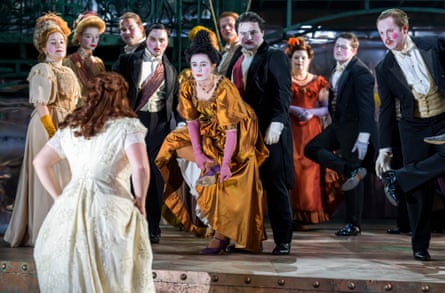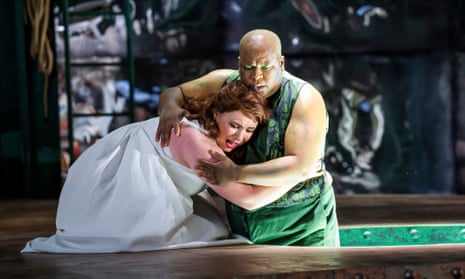“Man is an abomination of Nature who has turned his back on Mother Earth,” the witch Ježibaba tells the heroine in Dvořák’s Rusalka. In the context of her fury at the Prince’s rejection of the water nymph who has vainly sought to join humanity to experience love, she is, of course, overstating her case. But concern over man’s violation of the natural world lurks within Dvořák’s sad, beautiful fable, and hovers behind Jack Furness’s new production for Garsington Opera, which will also be seen in Edinburgh later this summer.
Avoiding fashionable post-Freudian glosses, Furness keeps us more or less within the bounds of fairytale, imbuing the opera with a genuine, if slightly sinister magic. Tom Piper’s set is dominated by a vast platform that rears upwards to reveal the watery world – and an onstage pond – below, where Musa Ngqungwana’s Vodník looks anxiously on as Natalya Romaniw’s Rusalka pines for Gerard Schneider’s Prince. The creatures in the forest above are played by whirling aerialists and acrobats, whose routines are spectacular but prove distracting, while Christine Rice’s Ježibaba, looking like some malign fin de siècle empress, casts her spells in a hut made from a massive skull.

The human world, in contrast, is superficially glamorous but grim. The carcasses of slaughtered animals hang from the ceiling of the palace kitchen, and at one point the Prince, ever the huntsman, disembowels a deer to present its heart to Sky Ingram’s imperious Foreign Princess. The court’s codified rituals, meanwhile, barely conceal the hypocrisies of crass sexual intrigue, and it is no wonder that Rusalka, now literally out of her element, is so poignantly and desperately adrift.
Much of the evening turns on Romaniw’s long-awaited performance in the title role, and she is unquestionably magnificent in it, her voice generous in tone, her delivery rapturous and ecstatic – particularly in the final scene with the equally passionate Schneider, when the pair of them unleash a torrent of sound and emotion that is overwhelming. Ngqungwana makes a sorrowful, lyrical Vodník, less malign than many. Rice gets Ježibaba’s mix of grotesque comedy and malevolence spot on, while Ingram, slightly steely in tone, bristles with hauteur and contempt. Douglas Boyd’s conducting is on the spacious side: his interpretation, in which Dvořák’s occasional Wagnerisms are much to the fore, slowly gathers weight and intensity as it goes. The playing (the Philharmonia) and choral singing (the Garsington Opera Chorus) are both excellent.

Comments (…)
Sign in or create your Guardian account to join the discussion